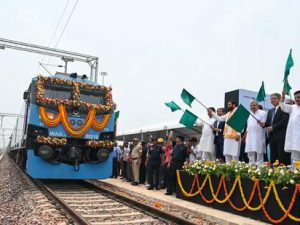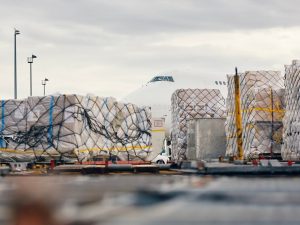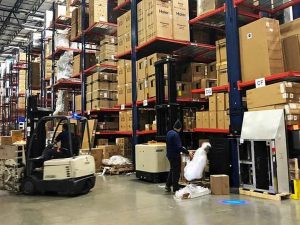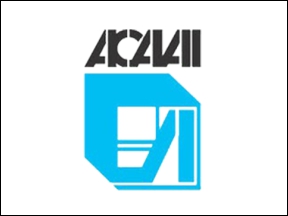Arun Kumar, President, AMTOI said, “The Logistics Performance Index (LPI) is more than just a metric—it reflects the overall health and efficiency of a country’s logistics ecosystem. While it is encouraging to see India’s, ranking improve in recent years, we must not lose sight of the broader picture. As the world’s fourth-largest economy, ranking 38th on the LPI suggests that there are still 37 nations outperforming us in critical logistics parameters. That gap demands serious introspection. One key bottleneck lies in how we diagnose the problem. Early on, the government cited a logistics cost figure of 14% of GDP and cantered its strategy solely on cost reduction. But this was based on questionable data and led to a narrow, often misguided, approach, what I would call a classic case of data-driven misdiagnosis. The real issues are far more systemic and behavioral. Our logistics sector continues to suffer from: Fragmented regulatory frameworks across ministries and states. Over-regulation and under-facilitation. A lack of trust between regulators and service providers. Slow adoption of standardization, digital integration, and interoperable systems. To address these, we must dig deeper, fixing the mindset that governs how we approach logistics policy. As Chanakya rightly advised, to solve a problem permanently, one must strike at its root. The root here is a legacy mindset that views business with suspicion and sees regulation as control rather than enablement. We need a fundamental shift, from process-centric governance to outcome-driven facilitation. This means building trust, embracing transparency, enabling risk-based compliance, and treating the logistics sector not just as a service industry, but as a national strategic asset. Only then will India’s LPI ranking truly reflect its economic standing and more importantly, its …
Read More »Green nod to auto Gati Shakti multimodal cargo terminal in Manesar
Union railway minister Ashwini Vaishnaw and Haryana chief minister Nayab Singh Saini inaugurated automobile Gati Shakti multimodal cargo terminal in Manesar, Haryana. The mega facility aims to boost multimodal connectivity and streamline freight movement across the country. Constructed at a cost of ₹117,091 million, the terminal is a joint initiative of the Haryana Rail Infrastructure Development Corporation Ltd (HRIDC) which holds a 55.4% stake, Haryana State Industrial and Infrastructure Development Corporation (HSIIDC) with 19%, and the Gurugram Metropolitan Development Authority (GMDA) with 5%. Lauding the rapid transformation of India’s railway infrastructure under the current government, the railway minister, said, “In just 11 years, the annual railway budget has risen from ₹25,000 crore to ₹2.5 lakh crore. Haryana’s allocation alone jumped from ₹315 crore before 2014 to over ₹3,400 crore,” he said.
Read More »Ethiopian Airlines expands fleet, touches down to HYD
To cater to growing pharma market and to further strengthen the bridge between the two rapidly growing markets, Ethiopian Airlines has officially started new flight to Hyderabad. The cargo will be carried in the belly of the aircraft. The inaugural flight departed from Addis Ababa Bole International Airport on June 16, 2025. With this launch, Hyderabad becomes the airline’s fifth Indian destination after Delhi, Mumbai, Bengaluru and Chennai. Hyderabad is a key player in India’s tech and pharma sectors.
Read More »Allcargo Gati joins ONDC network to boost logistics efficiency
Allcargo Gati has joined the Open Network for Digital Commerce (ONDC) Network, a Government of India backed initiative aimed at democratising and expanding digital commerce. This strategic integration enhances the accessibility of reliable, tech-enabled logistics solutions for businesses of all sizes—helping them streamline deliveries, optimise supply chains and boost operational efficiency. Ketan Kulkarni, Managing Director and CEO – Gati Express and Supply Chain Limited, said, “By joining ONDC Network for B2B, we align with the government’s vision of fostering an open and inclusive e-commerce ecosystem. Our mission is to empower customers with seamless logistics solutions that strengthen their market competitiveness. Through our robust express distribution network, we enable businesses of all sizes to efficiently reach customers across every corner of the country.”
Read More »‘Airfreight ex-India to Europe and West Asia has jumped about 30-45 %’
Amit Maheshwari, Founder and CEO, Softlink Global said, “Since Iranian airspace closed on 13 June, spot airfreight ex-India to Europe and West Asia has jumped about 30-45 %, and forwarders warn surcharges could touch 50 % if the stand-off drags on. High-value, time-critical loads—pharmaceuticals, electronics, auto parts and perishables—are scrambling for capacity. Eurocontrol data shows 1,800 flights were cancelled or diverted on day one, trimming export bookings and tonnage by mid-single digits already. Reroutes via Egypt or Turkey add 90 minutes to three hours of flying, stretching door-to-door schedules by roughly a full day and lifting insurance premiums further.”
Read More »‘Focus on innovation, safety & compliance must to rise above crisis’
“The crash of Air India flight is nothing short of a tragedy. The ripple effect of such aviation incidents extends beyond passenger flights. The air cargo sector, which is heavily reliant on the belly space of passenger aircraft, especially combi flights, also suffers disruptions. This compounds the pressure on the international logistics chain,” says Arun Kumar, President, AMTOI. He adds, “Adding to the complexity is the aggressive cost-cutting mindset among shippers, driven by ongoing global economic uncertainties. In pursuit of reduced logistics costs, many in the exim trade have begun disregarding critical safety regulations, particularly those concerning the International Maritime Dangerous Goods (IMDG) Code and Dangerous Goods Regulations (DGR). This growing negligence is contributing to an alarming rise in accidents across both air and ocean freight segments. The international logistics sector today is grappling with a trifecta of challenges: geopolitical conflicts, tragic accidents, and economic instability. Yet, if history is any guide, this sector has demonstrated remarkable resilience time and again. With coordinated efforts and renewed focus on compliance, safety, and innovation, the industry will rise above these adversities, stronger and more prepared than ever before.”
Read More »WFS gains Cargo iQ certification in Asia, Africa, ME
Worldwide Flight Services (WFS) has achieved Cargo iQ’s quality standards certification for its air cargo handling operations in Europe, the Middle East, Africa & Asia (EMEAA). The accreditation covers some 50 major airport stations in India, Belgium, Denmark, France, Germany, Ireland, Italy, the Netherlands, South Africa, Spain, Sweden, Thailand, and the UK. Developed by the industry, Cargo iQ’s Master Operating Plan (MOP) describes the standard end-to-end process of transporting air cargo and introduces standardised performance monitoring for the duration of shipment movements from consignor to consignee. For WFS and other handlers, this incorporates key export milestones such as shipment acceptance into the warehouse, confirmation that shipments are ready for carriage and have been manifested and departed. Using Cargo iQ’s quality processes for imports includes receipt of the cargo off the flight, notifying freight forwarders that goods are available for collection, and then completion of delivery to the agent. To be certified, companies must provide evidence that Cargo iQ’s MOP is embedded in their operations, as well as how they manage reporting, and look to continuously improve performance standards.
Read More »BENZ unveils its 3rd warehousing facility in Manesar, Haryana
BENZ Packaging has announced the launch of its third manufacturing facility in Manesar, Haryana, further scaling its production capabilities to serve the growing demand in heavy machinery packaging and long-term preservation solutions. Spread across 11,000 square feet (2,200 square yards), the state-of-the-art unit is equipped to manufacture a wide range of heavy-duty packaging products including nail-less boxes, pinewood boxes, industrial skids, and wooden pallets. The facility complements BENZ’s existing infrastructure, enhancing its ability to deliver fully integrated, durable, and export-compliant packaging systems. “This expansion marks a strategic step in our growth journey,” said Manan Chopra, Director at BENZ Packaging. “Manesar’s proximity to key industrial hubs and logistics corridors will allow us to serve our clients with greater speed, flexibility, and technical precision—especially in sectors like engineering, renewable energy, and heavy machinery exports.” With a focus on long-term preservation and corrosion prevention, the Manesar facility will also support BENZ Packaging’s robust portfolio of moisture-control solutions, including VCI-based packaging, desiccant integration, and export-grade wood treatment. These solutions are critical for clients shipping large equipment across diverse geographies and climate zones.
Read More »ACAAI to host 49th annual meet in Bali from 6-9 November
Block your calendar for the country’s biggest air cargo event, the Air Cargo Agents Association of India’s (ACAAI) 49th annual convention, all set to be held from 6-9 November 2025 in Bali, Indonesia at Renaissance Bali Uluwatu Resort and Spa. C K Govil, President, ACAAI shares, “It gives me immense pleasure to announce that the 49th ACAAI Annual Convention will be held in the enchanting island of Bali, Indonesia, from 6th to 9th November 2025. Bali, with its rich culture, warm hospitality and world-class infrastructure, promises to be the perfect setting for meaningful dialogue, networking and collaboration within our air cargo and logistics fraternity. I invite all our members and stakeholders to join us in this landmark event as we continue to explore new horizons and strengthen our collective vision for the future of Indian air cargo.”
Read More »‘Prolonged diversions increasing transit times, costs’
Kamal Jain, Director, Cargomen Logistics said, “The ongoing Iran-Israel conflict and regional airspace closures will have a lasting impact on Indian air cargo. Prolonged diversions will increase transit times and air freight costs, especially for time-sensitive goods like pharma and perishables. Exporters may shift to multimodal options like sea-air via Dubai or Singapore. Congestion at Indian airports is likely, affecting reliability. In the long term, businesses will diversify routes and target alternate markets. The situation will also push policymakers to invest in resilient air corridors, develop alternate hubs, and strengthen aviation treaties to ensure continuity in trade and reduce vulnerability to geopolitical disruptions.”
Read More » Cargo Breaking News
Cargo Breaking News








